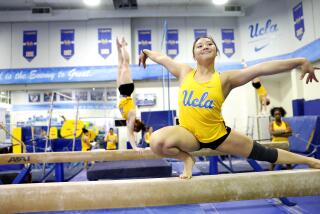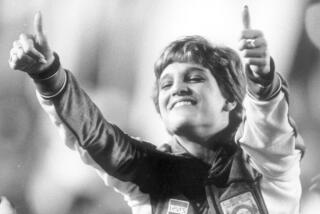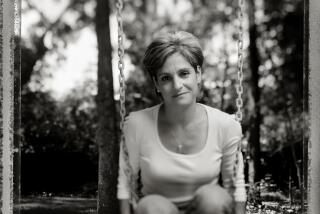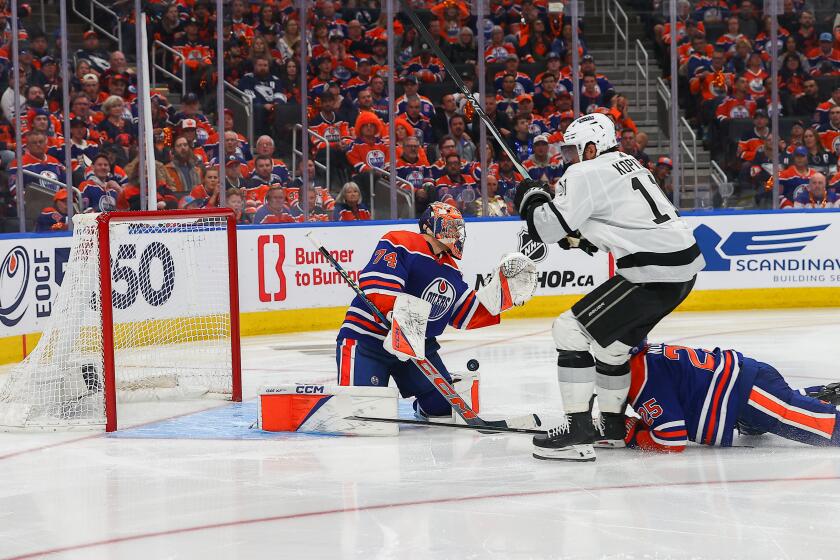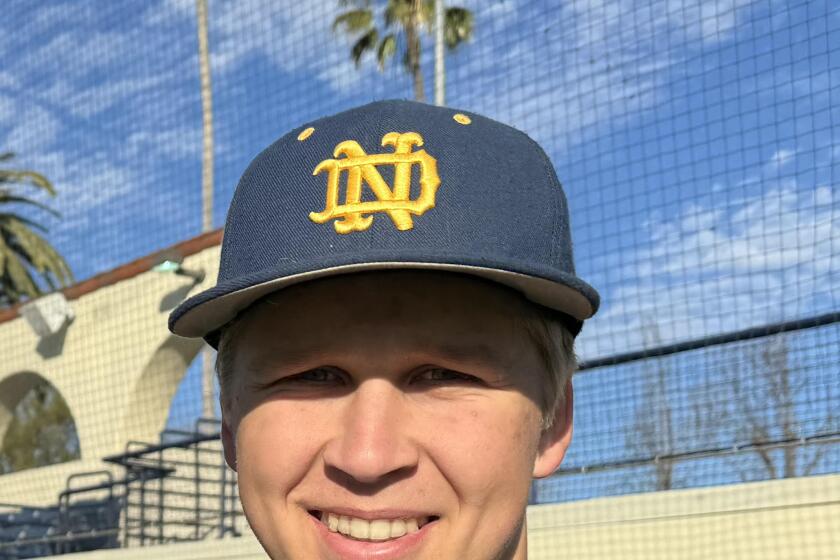Two Olympic dreams are floored by a one-two punch
Reporting from Airway Heights, Wash. -- Al Mitchell has trained world champions, Olympic gold medalists and dozens of national title winners in his five decades in boxing. But there was one thing he promised himself he would never coach: a woman.
Then Mikaela Mayer walked into his Michigan gym.
“And I really changed my mind,” said Mitchell, who learned his trade in the same Philadelphia gym that produced Joe Frazier. “If it was up to me, I’d have all women and no men.”
That’s not likely to happen. But at least Mitchell can console himself with the fact that the woman he does have is now among the best amateur fighters in the country.
Mayer, a former model from Los Angeles, turned a lot of heads — including Mitchell’s — last week when she made it to the final round of the U.S. Olympic Trials before losing a close decision at 132 pounds to Seattle’s Queen Underwood. And although that ended her bid to compete in the first Olympic boxing competition for women this summer in London, it clearly stamped Mayer as someone worth watching between now and the 2016 Games in Rio de Janeiro.
Patricia Manuel, a former national champion and two-time Golden Gloves winner from Long Beach, also experienced the end of her Olympic dream when she withdrew from the Trials because of a shoulder injury after only one bout.
But although Manuel says she’ll soon turn pro, forfeiting another run at the Olympics, the 21-year-old Mayer is remaining an amateur.
“You’re going to see her get way better,” Mitchell said. “She learns so quick. I found out the young ladies are more disciplined. It’s like they want to prove a point, that they’re better than the men.”
Disciplined was probably the last word anyone would have used to describe Mayer when she stumbled into a San Fernando Valley gym four years ago. A hard partier who had been kicked out of one West Valley high school for fighting and nearly flunked out of another, Mayer says she turned to boxing for direction and salvation.
Less than a year after climbing into the ring, she had won the first of two Golden Gloves championships. But the real change came 13 months ago when her father, Mark, a toy designer, hooked her up with a scholarship program at Northern Michigan University, where Mitchell coached.
A former coach of the men’s Olympic team, Mitchell had to be persuaded to accept Mayer.
“Mikaela’s father called me like eight or nine times about his daughter,” Mitchell said.
It may be helpful at this point to know that Mitchell’s favorite movie is “Million Dollar Baby,” in which Clint Eastwood plays a curmudgeonly, old-school boxing trainer who only reluctantly agrees to coach a raw female fighter, one who quickly becomes the most accomplished boxer in his stable.
Mitchell smiles at the similarities.
“The first two months, I just shook my head. Then all of a sudden she started waking up,” Mitchell said of Mayer. “I told her I’m not going to treat her as a woman. I’m going to treat her as a boxer. She’s tougher than I thought she was.”
And though the road to London has ended for Mayer, she’s wasting no time picking up the trail to Rio de Janeiro and the next Olympics. In less than a week, she’ll be back in the ring in the U.S. national championships, where she’ll fight at the non-Olympic weight of 141 pounds in the hopes of winning a berth in May’s world championships in China.
“I’m really proud of myself,” Mayer said of her performance at the trials, where she boxed eight rounds against the seemingly invincible Underwood, a five-time national champion, yet lost only two of them by more than a point. “It was a good learning experience.”
Days earlier Manuel was saying much the same thing, though for vastly different reasons, because her trials’ experience taught her it was time to get off the Olympic bandwagon for good.
Truth be told, it wasn’t a ride she ever intended to take in the first place. But in the months before women’s boxing was added in 2009 to the schedule for the London Games, Manuel’s pro debut had been canceled twice, once when her opponent pulled out and another time because of injury.
And although that persuaded her to give the Olympics a try, last week’s injury let her know it was time to gear up for professional boxing again.
“Amateur, this really isn’t my style,” Manuel, 26, said of international-style scoring, which rewards punches landed regardless of their impact. “I want to go to a sport where it’s mostly about fighting rather than points.”
Her trainer, Robert Luna, believes the transition will be a smooth one.
“I think she can be a world champion,” said Luna, who helped welterweight Javier Molina, a 2008 Olympian, step up to the pro ranks after the Beijing Games.
Manuel took up fighting about nine years ago when her grandmother bought her a membership in a boxing gym to help her lose weight. Within a few months, the chubby teenager had talked her way into a competitive fight, and though she was pummeled, the experience hooked her on boxing.
Eventually, she badgered a reluctant Luna into letting her train at his small gym in Commerce. Now the two are inseparable.
“If he tells me to jump off a bridge, I’ll do it because I know he has my best interests at heart,” Manuel said.
Which is why Luna called the decision to pull Manuel from the Olympic Trials among the most difficult of his career. Over the last three years, Manuel has dealt with plantar fasciitis, ankle problems, a bruised kneecap, hand surgery, partial dislocations and ligament damage. And that’s in addition to the compressed shoulder joint that derailed her Olympic dream.
“I knew in my heart what had to be done,” Luna said. “We’re talking about a career-ending injury potentially happening. ... I was just going by my instincts.”
After that last fight, as Manuel fought back tears of pain and disappointment, her mother, Loretta Butler, wrapped the boxer in her arms and whispered, “I love you.”
Said Butler later: “Look at what she achieved. I’m prouder of that than any gold medal.”
More to Read
Get our high school sports newsletter
Prep Rally is devoted to the SoCal high school sports experience, bringing you scores, stories and a behind-the-scenes look at what makes prep sports so popular.
You may occasionally receive promotional content from the Los Angeles Times.
